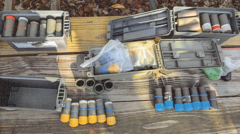The FBI has made a significant breakthrough in a raid conducted on a Virginia farm, where they uncovered an astonishing cache of more than 150 explosive devices. This discovery is being marked as potentially the largest seizure recorded by the agency. The investigation was initiated after Brad Spafford, a resident of Isle of Wight County, was arrested on December 17, following a tip-off regarding his suspected accumulation of weapons and homemade ammunition.
Spafford's arrest has drawn media attention due to the alarming nature of the explosives found, some of which were reportedly stored in an unsecured backpack labeled "#nolivesmatter," suggesting a possible connection to extremist far-right ideologies. While Spafford's lawyer argues that he poses no threat to the community and is fighting for his pre-trial release, current charges only include possession of an unregistered short-barreled rifle, though investigators anticipate further charges.
The initial assessments from the FBI classify the discovered devices primarily as pipe bombs. Most of the explosives were housed in a detached garage, categorized by color and some even labeled as "lethal." Disturbingly, several bombs were found packed into a wearable vest, contributing to the chilling narrative of the raid. Additionally, a jar containing HMTD, a highly volatile and sensitive explosive, was discovered improperly stored in a household freezer next to food items accessible to Spafford's young children.
The implications of Spafford's actions are alarming, as he allegedly expressed radical views, including hoping for the assassination of Vice President Kamala Harris and making unsettling statements about missing children purportedly being trained as school shooters. A neighbor, who previously worked in law enforcement, provided critical evidence that led to the FBI's involvement, noting Spafford's dangerous experimentation with explosives despite a history of serious injury.
Following the judge's preliminary ruling to grant Spafford electronic monitoring, there has been a push from the government to keep him detained pre-trial, highlighting a complex tension between concerns for public safety and rights to due process. Spafford's defense contends that the prosecution's claims are solely backed by speculation and political bias, emphasizing the lack of criminal records or direct threats made by him.
The situation continues to draw attention, raising numerous questions about the intersection of extremism, public safety, and individual rights in contemporary society. As the investigation unfolds, many are left contemplating the broader implications of such incidents in a climate of increasing domestic unrest and polarization.





















